In recent weeks, there have been many developments in BC related to investing in education and supporting unique learners, as well as a virtual tidal wave of stories about teacher and school resource shortages and budgetary cuts for non-core educational services.
Specifically, in Budget 2024, the BC government announced new initiatives to improve student literacy, focusing on early screening and interventions for dyslexia and other learning differences (disabilities). While the commitment to literacy is commendable, and we certainly agree there needs to be more investment and attention to this area, there are some questions about the scope, scale and distribution of the $30 million budget allocation over three years for the 10-20% of the provincial population that has learning differences (LDs). You can read Dyslexia BC’s synopsis and critique of this announcement here.
Then there are calls from parents and educators’ unions who say that BC’s second-largest school district understaffing has kids with special needs getting less support and workers stretched thin. And reports of record numbers of uncertified teachers working on Letters of Permission to fill teaching vacancies, as well as critical shortages in Education Assistants (EAs) and other special education supports, early education and Strong Start programs, and other resources. This is on top of a system that was already overextended in terms of being able to support students with unique needs or provide them with a waitlist spot for diagnostic psychoeducational assessments.
Knowing the above and then hearing in the same news cycle that three levels of government are investing almost $600 million in hosting some of the upcoming World Cup soccer games on the promise of widespread economic returns does cause one to pause.
How are we measuring economic and social returns? Why aren’t we applying the same social and economic return analysis on ‘investment’ to our children, youth and families?
There is a much bigger, long-term time scale that we are not capturing well here.
We know that investing in our children and youth, specifically in their education, provides many multipliers over time. We also know that NOT investing in those who need the most support – in this case, those who are neurodivergent or have learning differences – causes a higher risk of severely detrimental learning and life outcomes (see just some of the many stats on graduation rates, poverty, mental health and incarceration). Layer on top of that the intersectional barriers that many students and families face in understanding and navigating our education and related support systems, and the stigma, stress, financial strain, language barriers and more that they have to face when, or if, they find appropriate, qualified support for their children or themselves. The result is an incredible need, province-wide, for meaningful, specialized learning and social-emotional support for our students and families. It’s a need that requires a sustained, significant investment and a deliberate shift in our priorities.
If we invest more in supporting our vulnerable children, youth, and families earlier, we can turn some potentially dangerous and damaging outcomes around or mitigate them. It’s a sound, long-term investment that builds self-esteem, confidence, and many transferable skills in our young citizens, reduces mental and financial strain on families, and helps lift up our communities.
While these news cycles keep turning and the clock keeps ticking for our children and youth, here’s what our team at LDS is doing:
- We offer province-wide RISE One-to-One (RISE: Research-informed Individualized Student Education) instruction tailored for each student based on their suspected or diagnosed learning difference(s).
- Thanks to our generous supporters, we offer all our individual and small group programs on a sliding scale based on household income and other exceptional needs.
- We offer informal and formal assessments to help give a better picture of learning strengths and stretches, executive function challenges, and more. We also offer referrals to psychoeducational assessments (limited to LDS students) and will soon offer them more broadly on a sliding scale.
- We provide early identification and intervention and early literacy support.
- Family Coaching helps parents and caregivers better understand and support their children’s academic and advocacy needs.
- Workshops for families, students, educators, and administrators will help them understand learning differences and neurodivergence and make smooth transitions into kindergarten, high school, the workforce, or post-secondary.
If you want to learn more about how our expert and compassionate educators at LDS can support your neurodivergent child or yourself, please reach out. We’ll do our very best to meet you where you’re at and work as a team to build from there.
– Rachel S. Forbes, Executive Director
LDS is a community of dedicated professionals who write collaboratively. We recognize the contribution of unnamed team members for their wisdom and input.


